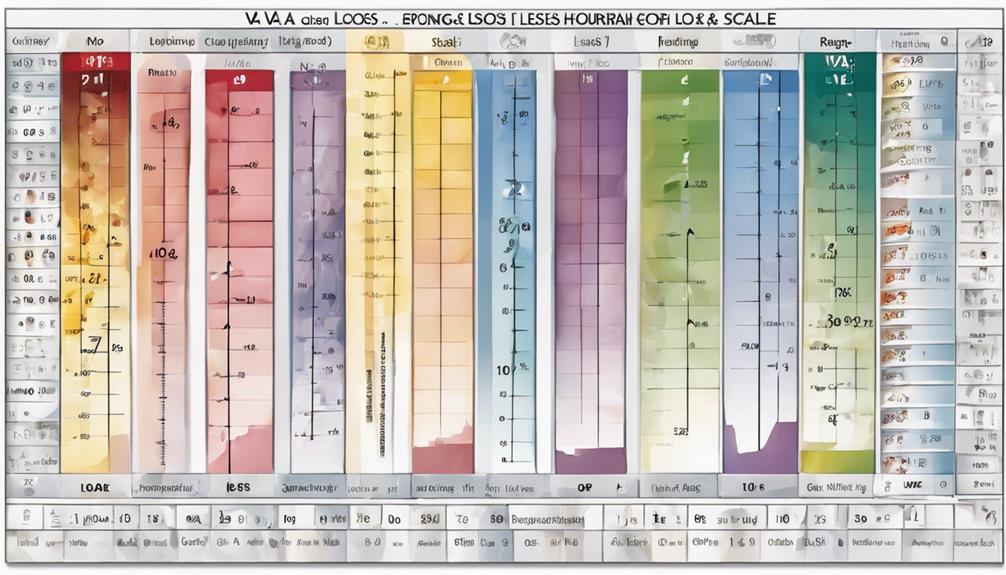As we delve into the world of VA disability benefits for hearing loss, it’s akin to unraveling a complex puzzle where each piece is vital in offering necessary assistance to our veterans.
Picture this: a veteran's journey to establish a link between their hearing loss and military service is a crucial step towards accessing the benefits they deserve.
But what happens when the pieces don't quite fit together seamlessly?
Join us as we explore the intricacies of eligibility requirements and the pathways veterans can take to secure the assistance they've earned.
Key Takeaways
- Veterans must link hearing loss to service for VA benefits.
- Meeting VA criteria and providing evidence is crucial.
- Seek support for application and appeals for hearing loss.
- Changes in rating criteria and special compensation possible.
Eligibility Criteria for VA Hearing Loss Disability
Establishing eligibility for VA hearing loss disability benefits requires veterans to provide compelling evidence linking their hearing impairment to their military service. To meet the eligibility criteria, veterans must demonstrate a service connection by showing an in-service event or exposure that led to their hearing loss.
Additionally, having a current diagnosis of hearing loss is crucial, along with a medical opinion connecting the condition to their time in the military. The severity of the hearing loss and its impact on daily life play a significant role in determining eligibility for VA disability benefits.
Meeting the specific VA criteria for hearing loss disability ratings is essential for veterans to receive compensation and support. By fulfilling these requirements, veterans can ensure that they receive the benefits they deserve to help them cope with the challenges posed by their hearing impairment.
Applying for VA Hearing Loss Benefits

When applying for VA Hearing Loss Benefits, veterans must provide compelling evidence linking their hearing impairment to their military service. This evidence is crucial in establishing a service connection, demonstrating that the hearing loss is a result of events that occurred during active duty, such as combat service or exposure to loud noises.
The VA evaluates these claims using specific tests like the Maryland CNC Test for speech discrimination and the Pure-Tone Audiometric Test for measuring the ability to hear soft sounds. If a veteran's hearing loss claim is denied, seeking assistance from veteran-owned law firms specializing in VA disability claims can be beneficial in navigating the appeals process.
Furthermore, veterans who've suffered hearing loss due to faulty 3M earplugs may have grounds to pursue compensation for their impairment. By understanding the intricacies of the application process and seeking appropriate support, veterans can work towards securing the hearing loss benefits they deserve.
VA Disability Ratings for Hearing Loss
How are VA disability ratings determined for hearing loss? VA rates hearing loss from 0% to 100% under Diagnostic Code 6100. When assessing the severity of hearing loss, the VA considers various factors to determine the appropriate rating.
Here are some key points to understand about VA Disability Ratings for Hearing Loss:
- The average VA disability rating for hearing loss is 10%, indicating the prevalence of this disability among veterans.
- Tinnitus, often associated with hearing loss, can be rated at 10% as a separate disability, highlighting the interconnected nature of these conditions.
- Changes in rating criteria for tinnitus are anticipated, underscoring the VA's commitment to continually improving the evaluation process for hearing-related disabilities.
Understanding the nuances of VA disability ratings for hearing loss is crucial in ensuring that veterans receive the appropriate compensation and support they deserve. By accurately assessing the impact of hearing loss on an individual's life, the VA can provide the necessary resources to enhance their quality of life.
Compensation Levels for Hearing Loss

As veterans navigate the complexities of VA disability ratings for hearing loss, understanding the compensation levels tied to these ratings becomes pivotal in ensuring comprehensive support and recognition of their service-related conditions.
VA disability ratings for hearing loss can vary from 0% to 100%, with an average rating of 10% due to the prevalence and impact of this disability among veterans.
Tinnitus, another common condition among former service members, can also be rated at 10%, separately from hearing loss. It's worth noting that changes in the rating criteria for tinnitus are anticipated, which could potentially affect compensation levels for affected individuals.
Moreover, veterans experiencing profound hearing loss in both ears may qualify for Special Compensation under specific VA disability rating guidelines.
Getting TDIU Benefits for Hearing Loss
Navigating the process of obtaining Total Disability Individual Unemployability (TDIU) benefits for hearing loss requires veterans to demonstrate the significant impact of their hearing impairment on their ability to secure or maintain gainful employment. To qualify for TDIU benefits, veterans with hearing loss must show that their condition hinders them from obtaining and retaining substantially gainful employment. These benefits ensure veterans receive compensation at the 100% disability rate, regardless of their overall disability rating, if their hearing loss affects their employability.
Veterans seeking TDIU benefits for hearing loss may need to provide compelling medical evidence, undergo vocational assessments, and present their employment history to support their claim. By offering financial support to veterans unable to work due to the profound effects of their hearing impairment on their ability to secure gainful employment, TDIU benefits serve as a crucial lifeline for those who've sacrificed for their country.
Frequently Asked Questions
What Amount of Hearing Loss Qualifies for VA Disability?
We qualify for VA disability benefits for hearing loss when our audiometric test results show a minimum rating of 10%. The severity of our hearing loss is determined by the Pure-Tone Audiometric Test, assessing puretone thresholds.
If we've profound hearing loss in both ears, we may be eligible for a 100% disability rating. The VA considers the impact of our hearing loss on daily functioning when determining our disability ratings.
What Amount of Hearing Loss Qualifies for Disability?
We understand that determining the amount of hearing loss that qualifies for disability benefits can be complex. Hearing loss severity is crucial for eligibility, and VA conducts specific tests to assess this.
The percentage of disability granted varies based on the impairment level in both ears. Veterans with profound hearing loss in both ears may be eligible for a 100% disability rating.
It's essential to establish service connection for VA disability benefits.
What Does 80% VA Disability Entitle You To?
At 80% VA disability, we receive substantial monthly compensation and support for hearing loss-related expenses. Additional benefits like Vocational Rehabilitation and caregiver services may be accessible.
This rating reflects significant impairment, potentially qualifying us for special compensation. It's crucial to understand the range of benefits available and how they can aid in managing hearing loss challenges effectively.
How to Get a Free Ipad From the Va?
We can't stress this enough: the VA doesn't offer free iPads for hearing loss disability. While the VA provides valuable benefits like compensation and healthcare for service-related disabilities, iPads aren't part of the package.
However, the VA does offer assistive technology like hearing aids and communication devices to support veterans with hearing loss. If you need specific devices, the VA can help, but free iPads aren't standard benefits for hearing loss.
Conclusion
In conclusion, navigating the VA hearing loss disability benefits process can be complex but crucial for veterans. Understanding the eligibility criteria, submitting thorough evidence, and seeking appropriate compensation levels are key steps.
Our article sheds light on the challenges veterans may face and emphasizes the importance of persistence and patience throughout the evaluation process. Let's remember to be proactive, prepared, and patient in pursuing the benefits our veterans deserve.










